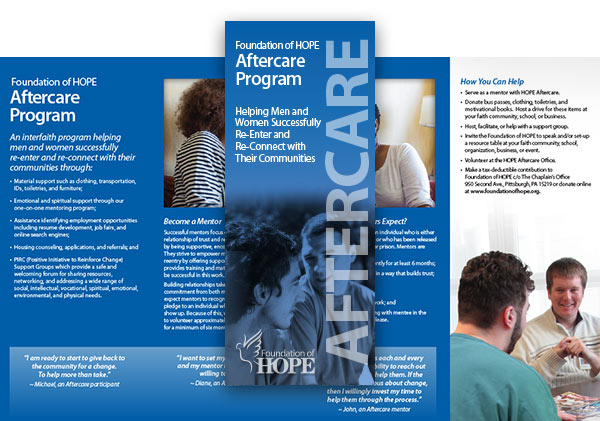AFTERCARE PROGRAM
With our help, he’s beginning to put his past behind him.
DONATE
GET INVOLVED
Encouraging and Supporting on the Outside
Many formerly incarcerated individuals return to jail after their release because they lack informal and formal support systems needed to help them successfully reintegrate back into their communities. The HOPE Aftercare Program is an interfaith pre- and post-release adult reintegration program for citizens and reentrants that seeks to ensure their successful return to the community. HOPE Aftercare provides re-entrants with material assistance, informational resources, referrals, and guidance regarding employment, housing, and other social services. Assistance includes but is not limited to:
- toiletries;
- employment counseling;
- resume development;
- IDs;
- housing counseling;
- furniture;
- clothing;
- computer lab; and
- reading glasses.
Supporting Individuals along Their Journey through Reentry
Foundation of HOPE’s Mentoring Program
The Foundation of HOPE’s Mentoring Program matches individuals incarcerated at the Allegheny County Jail (and formerly incarcerated individuals) with mentors who can support them on a one-to-one basis. Upon release, a mentor continues to meet with their mentee to provide support during their transition back into the community. Mentors work collaboratively with their mentee to develop goals, address practical needs, and walk alongside of their mentee during their journey.
If you have the desire to assist another in overcoming personal barriers and creating space for transformation and would like to learn more about serving as a Foundation of HOPE mentor, please contact Barb Kralik, Mentor Coordinator.
PIRC Support Groups
On the outside, our weekly PIRC (Positive Initiative to Reinforce Change) Support Groups provide a safe and welcoming forum for reentrants and their supporters to share resources, network, and address social, intellectual, vocational, spiritual, emotional, environmental, and physical needs.
How You Can Help
The HOPE Aftercare Program has provided individuals with resources and support to successfully reconnect with their communities and families in positive and meaningful ways. We rely on the support of others like you to help us make a difference. Find out how you can get involved by sharing your gift of time or financial support.


